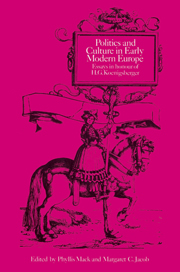Book contents
- Frontmatter
- Contents
- Introduction
- The court of the Spanish Habsburgs: a peculiar institution?
- The magnificent Lorenzo de' Medici: between myth and history
- Political rhetoric and poetic meaning in Renaissance culture: Clément Marot and the Field of Cloth of Gold
- The unlikely Machiavellian: William of Orange and the princely virtues
- The Estates of Brabant to the end of the fifteenth century: the make-up of the assembly
- Presents and pensions: a methodological search and the case study of Count Nils Bielke's prosecution for treason in connection with gratifications from France
- Between Bruni and Machiavelli: history, law and historicism in Poggio Bracciolini
- Constitutional discourse in France, 1527–1549
- Lieuwe van Aitzema: a soured but knowing eye
- John Calvin's contribution to representative government
- Luther and the humanists
- Scholars and ecclesiastical history in the Early Modern period: the influence of Ferdinando Ughelli
- ‘By an Orphean charm’: science and the two cultures in seventeenth-century England
- The crisis of the European mind: Hazard revisited
- Isaac Beeckman and music
- Decadence, shift, cultural changes and the universality of Leonardo da Vinci
- Bibliography of the writings of HELMUT GEORG KOENIGSBERGER
- Index
Scholars and ecclesiastical history in the Early Modern period: the influence of Ferdinando Ughelli
Published online by Cambridge University Press: 20 October 2009
- Frontmatter
- Contents
- Introduction
- The court of the Spanish Habsburgs: a peculiar institution?
- The magnificent Lorenzo de' Medici: between myth and history
- Political rhetoric and poetic meaning in Renaissance culture: Clément Marot and the Field of Cloth of Gold
- The unlikely Machiavellian: William of Orange and the princely virtues
- The Estates of Brabant to the end of the fifteenth century: the make-up of the assembly
- Presents and pensions: a methodological search and the case study of Count Nils Bielke's prosecution for treason in connection with gratifications from France
- Between Bruni and Machiavelli: history, law and historicism in Poggio Bracciolini
- Constitutional discourse in France, 1527–1549
- Lieuwe van Aitzema: a soured but knowing eye
- John Calvin's contribution to representative government
- Luther and the humanists
- Scholars and ecclesiastical history in the Early Modern period: the influence of Ferdinando Ughelli
- ‘By an Orphean charm’: science and the two cultures in seventeenth-century England
- The crisis of the European mind: Hazard revisited
- Isaac Beeckman and music
- Decadence, shift, cultural changes and the universality of Leonardo da Vinci
- Bibliography of the writings of HELMUT GEORG KOENIGSBERGER
- Index
Summary
The sixteenth and seventeenth centuries saw a remarkably rapid evolution in the aims and teachings of church history, both in Protestant and Catholic areas of Europe. That the early sixteenth century was obsessed with church history is hardly surprising. The history of the church was one of the most potent elements in controversial literature while the ideological struggle which we label ‘Protestant’ and ‘Counter-Reformation’ took shape.
In many ways, the interest in the history of the church was more vehement in Protestant areas than in Roman Catholic ones, and for compelling reasons. The Protestant had to investigate the history of the church he was criticising, had to defend his rebellion, so to speak. Put in other words, he was concerned to demonstrate that he was not really a rebel; that his church was the true church, near, very near, to the primitive church; and above all that his hierarchy was every bit as authentic as the Roman one (that is, orders in the Lutheran or Anglican Church were derived from the apostles). This was to remain an Anglican preoccupation down to the nineteenth century, when Bishop Stubbs produced massive evidence on the episcopal succession in his Registrum sacrum Anglicanum. It can indeed be traced back to some of the Tudor historians, and not least to the great collector and patron Matthew Parker, who compiled an account of the British church and its privileges together with a list of the seventy archbishops, a book which was privately printed in 1572.
- Type
- Chapter
- Information
- Politics and Culture in Early Modern EuropeEssays in Honour of H. G. Koenigsberger, pp. 215 - 230Publisher: Cambridge University PressPrint publication year: 1987

